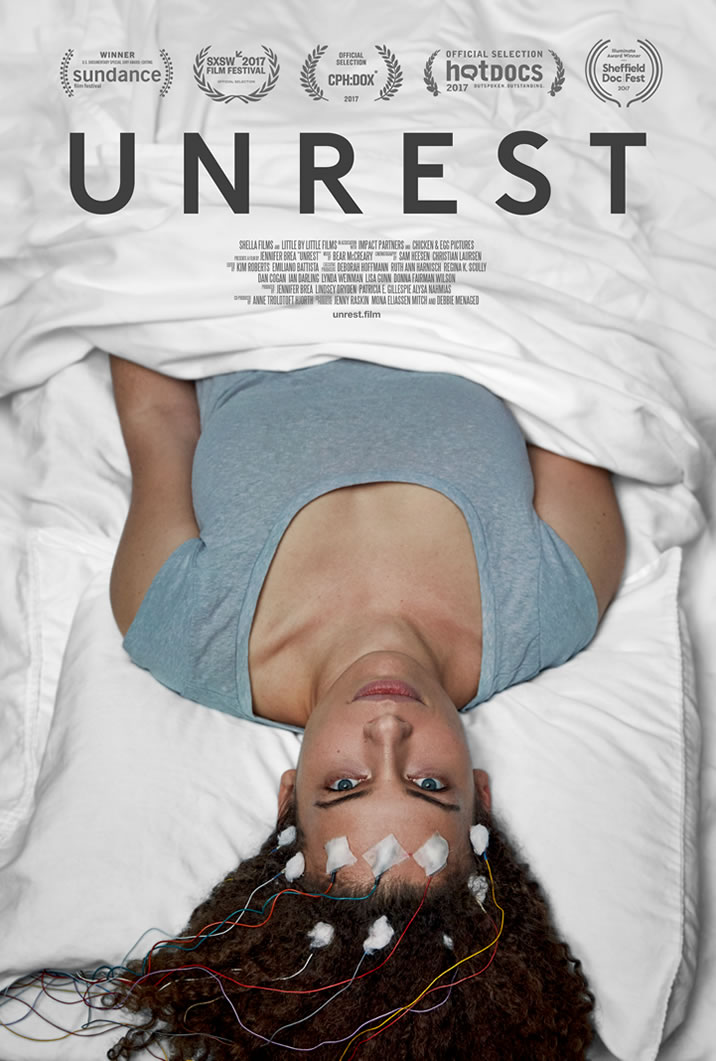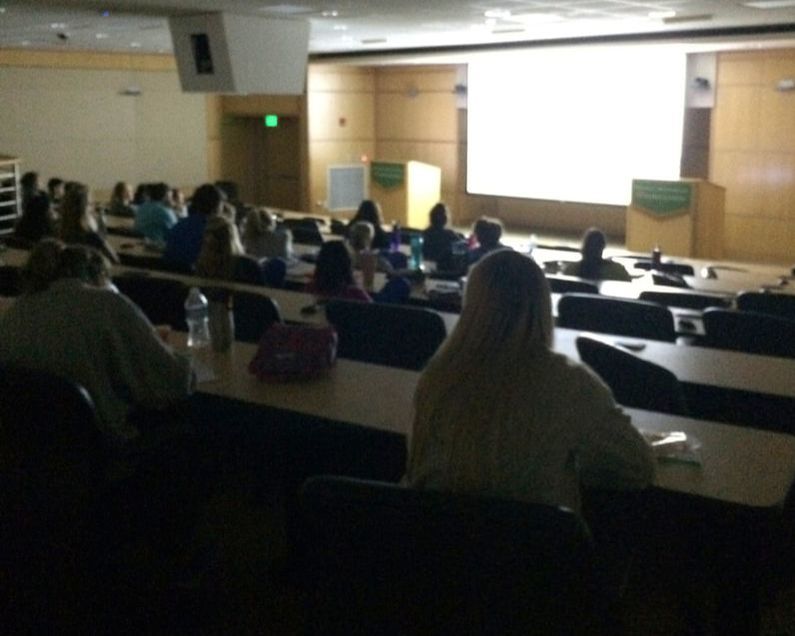|
Earlier this week, a screening of the film Unrest was held for students and faculty in occupational therapy education programs. The film, a documentary by Jennifer Brea, tells the story of several individuals diagnosed with myalgic encephalomyelitis, or ME, which is often referred to as Chronic Fatigue Syndrome. The film has won awards at Sundance and other film festivals. I first learned about Unrest about a year ago through conversations on Twitter, and I reached out through the film's website to inquire about hosting a screening on campus. A few months ago, I got an email from a member of the screening team with whom I corresponded to work out the details leading up to the screening event. In addition to the occupational therapy students on the campus where I teach, an invitation to attend the screening was also extended to occupational therapy assistant students at another institution in the area, and several of those students attended the event as well. After the film was shown, I asked the students to consider sharing what their big take-away was, if anything had surprised or really struck them from the film, and how what they saw might have impacted their ideas as a future OT practitioner. Several students made comments about how disheartening and frustrating is it that the stigma surrounding conditions like ME serves as such a huge barrier in our society, both for the individuals diagnosed and their caregivers. The resiliency of the people in the film impacted the viewing audience at the screening, as did their apparent drive for purpose and meaningful connection, both of which are intertwined with occupations and the philosophy of OT. We agreed that there were a number of memorable quotes in the film, including the comment Jen made about there being such a difference between being alive and living - again, another point that really resonates with occupational engagement. One student noticed that there was a line in the movie about spoons, a concept that relates back to The Spoon Theory, which we discussed in a course the students took last spring. Finally, the comment was made that it isn't just those diagnosed with ME that may feel disconnected, stressed, or depleted: Caregivers are also likely to experience these things and many other emotions, and this is an area in which there seems to be a place for occupational therapy to play a role. A couple of images from the documentary that students said will stick with them as they continue to work towards entering the field of occupational therapy come from the scene in which Omar is struggling to get Jen back into their house after the rally and the footage of the shoes from the protest. ... one of the things that I've learned ... is how resilient humans are, and that, when we face challenges that we think will break us, we can find within ourselves resources that we didn't know we had." ~Jen Brea That [pre-illness] life is gone, but here I have this new one, and I have to fight for it." ~Jen Brea, in Unrest In conclusion, the OT students and faculty enjoyed learning about ME and related topics through the viewing of this documentary, and we recommend that all healthcare practitioners and students watch the film.
9 Comments
Holly
8/22/2017 01:47:14 pm
Thank you so much, Stephanie! You give me hope that there are healthcare practitioners that care. They just need to be reached! Thank you for taking initiative and arranging this screening. I think it is great your students also know about #spoonies and spoon theory as it is a vernacular many of us use to help explain our level of functioning. You are what your profession should be! Thank you. Hopefully other practitioners will follow your lead.
Reply
8/22/2017 02:42:39 pm
Wow, thank you, Holly! I moved from clinical work into academia four years ago precisely for that reason: to do what I can to keep the heart in healthcare. It's my honor to be in a position to teach and learn from this group of OT students. Thank you again for your comment!
Reply
Brenda Hankins
8/22/2017 02:22:53 pm
Thank you so much for having this screening for OT students. I was in my 20s beginning my OT career when I became disabled with M.E. Some of my colleagues were prejudice about the diagnosis, unfortunately, and some of them reached out to apologize 10 years later after learning more about M.E. This film is important for learning what barriers to care patients and caregivers face. Thank you for leading the way!
Reply
8/22/2017 02:40:33 pm
Hi Brenda,
Reply
Amy Mooney
8/22/2017 03:21:33 pm
Stephanie and OT students,
Reply
8/22/2017 11:22:45 pm
I just wanted to also publicly think you Stephanie! It does give me hope too. TN often seems an almost impossible state to affect healthcare/awareness/policy/law change in for me. Thank you anf your students! You are the exact advocates we so desperately need! Honestly thank you in behalf of me, my husband, my son and so many that need you to shine your lights for us in the dark tunnels. Sometimes I can see that light at the rnd of the tunnel and it's because of caring people like you that open your minds and hearts to us
Reply
8/23/2017 04:26:32 pm
Hi Stephanie,
Reply
Rivka
8/23/2017 08:21:23 pm
GREAT write up. Thank you so much for showing this very important film.
Reply
8/24/2017 01:08:17 pm
Thank you SO MUCH, Stephanie, for arranging this screening, of #Unrest and making this impactful step towards changing the stigma of, and therefore in time, the care options for those with ME/CFS. Sending you my support and gratitude! -Kandice Dickinson | Former opera singer, music professor, ardent gardener and active part of society turned (on 10 December 2000) mostly bed+housebound ME/CFS patient, researcher, treatment-guinea-pig, and activist plus still-a-musician-in-my-heart, digital artist and half-a-dewdrop-as-much-talent-as-my-cousin-Emily-Dickinson humble poet.
Reply
Your comment will be posted after it is approved.
Leave a Reply. |
AuthorStephanie Lancaster, EdD, OTR/L, ATP is an occupational therapist with over 30 years of clinical experience. As an associate professor, Stephanie trumpets the value of teaching and practicing in the field of OT in an "out loud" manner. Archives
December 2021
Categories |
| The Outloud OT |


 RSS Feed
RSS Feed
